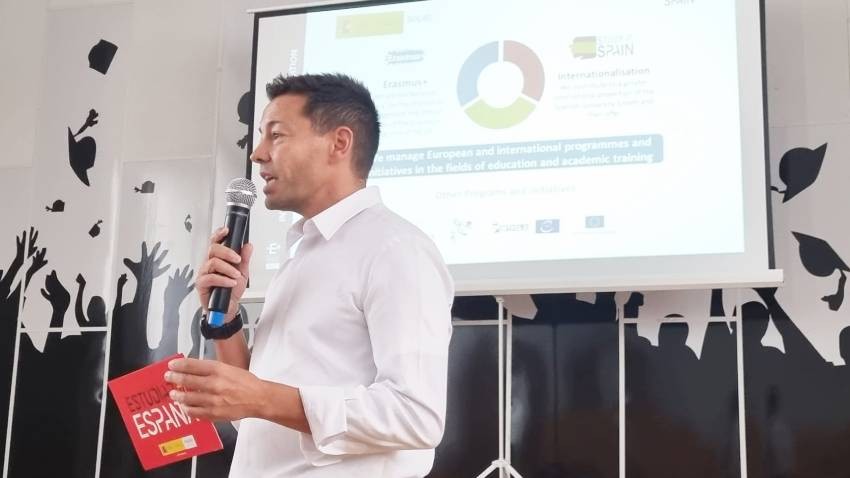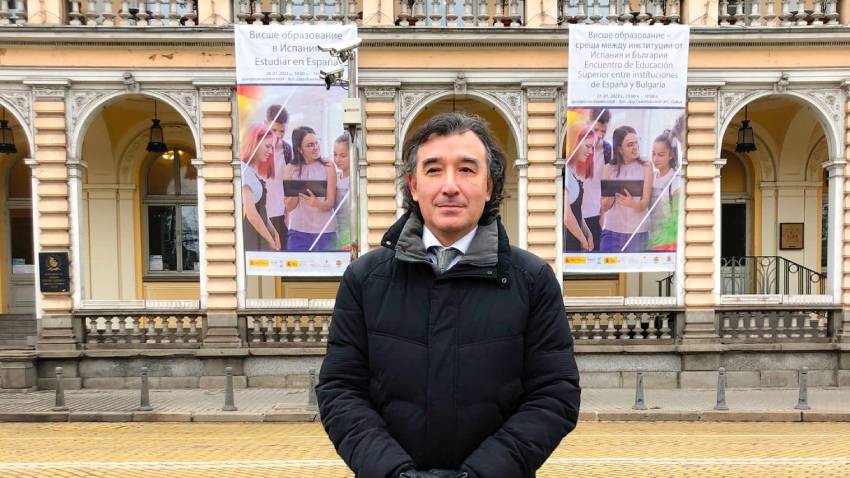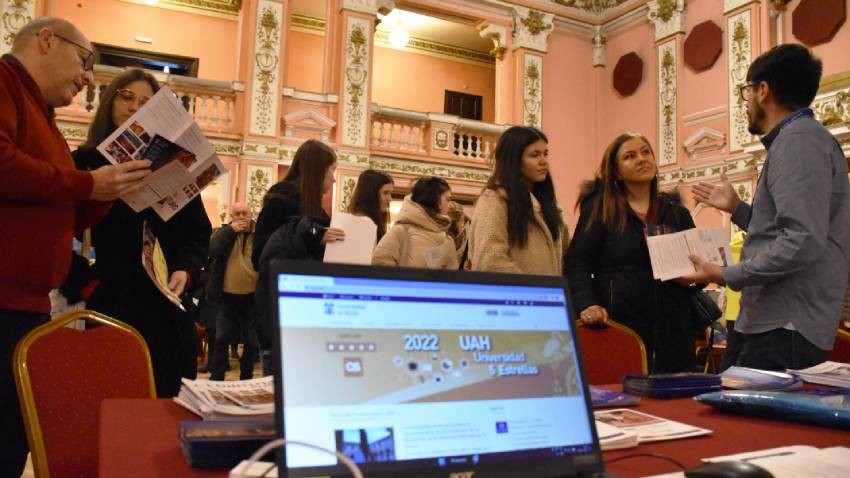The first edition of the Education in Spain exhibition was fruitful for both sides. As we already informed you, the event was organized by the Education Department of the Embassy of Spain in Sofia, the Spanish Service for the Internationalization of Education (SEPIE) with the support of the Bulgarian Ministry of Education and Science and Sofia Municipality. The forum was attended by 10 universities from Spain, which presented their educational programmes to prospective students and informed them about the conditions for enrolment and living in their respective areas of Spain. Meetings were also held between the nine Bulgarian universities and the Spanish higher education institutions to prepare the ground for further cooperation and signing of agreements.
One of the most active participants in the exhibition was Jordi Marin, Technical Advisor at SEPIE, responsible for Europe, Canada and Oceania. In a interview with Radio Bulgaria Mr. Marin gave an insight into how the meetings with the Bulgarian universities went and what his impressions of the Bulgarian students were:
"There were 10 universities from Spain and 9 from Bulgaria. We do not have official agreements yet, but the meeting was very fruitful for both sides. From the Bulgarian side there was a desire for more such events where future cooperation agreements can be negotiated. I was very pleasantly surprised by the high academic level here, as well as the good command not only of Spanish but also of English, which makes communication much easier. The students have shown a very keen interest in science and technology. I would say that they are equally interested in the humanities and the sciences. They also asked about veterinary medicine, human medicine, psychology, international law, Spanish philology, translation, aerospace engineering."
"I came to Bulgaria with very good expectations, which were met and even exceeded," said Francisco Fermín Mallén, Director of the Department of International Relations at the University Jaume I, in Castelló de la Plana.
"I was very pleasantly surprised by what I saw in Bulgaria. We visited several language schools where I met students who showed great interest in the new things we presented to them. I didn't expect so many people to visit us at the exhibition on Saturday. I must say that the interest exceeded my expectations. They asked us about the locations, about the education we offer, about the cost of living in Spain, about the scholarships. After the conversations we had with the universities, we will start with the basics - the mobility of students and teachers. We have found points of contact with many of the universities and I hope that we will soon have contracts to move forward together. I also work as a lecturer in Spain, I have taught Bulgarians and the good impressions I had were confirmed here."
"The University of Las Palmas de Gran Canaria already offers scholarships for Bulgarian students and a wide range of courses," said Dr. Jin Taira, Vice-Rector in charge of internationalisation and mobility at the university:
"My first impression is excellent, I saw very well-mannered students, eager to learn. Language will not be an obstacle to their studies. We don't know if they will stay in Spain, but I see in them a desire to contribute to their homeland. It was a pleasure to talk to them and advise them on the possible way to study in Spain. They wanted to know about law, architecture, psychology, how much it would cost to study and live in the Canary Islands and whether there was a hostel. Tuition is not expensive with us, because the university is state-run, and it comes out to about 1000 euros. As for the cost of living, it is very similar to the rest of Spain. The city of Las Palmas is one of the nine biggest cities in Spain and prices are normal'.
Maria-Yoana Dimitrova is 19 years old, already studying Law at Sofia University “St. Kliment Ohridski”. She was also a coordinator of the event. Although she will finish her studies in Bulgaria, she also plans to pursue a master's degree in Spain.

"Spain is too beautiful not to be attracted by it. I plan to go there in the future under the Erasmus programme of Sofia University or to do a Master's degree in Business Administration or Law. What attracts young people is the life in Spain, the beauty of the country and the exciting everyday life there, and in terms of universities it seems that prospective students are more oriented towards the humanities."
In the summer of 2014, photographer Philippe Bazin and philosopher Christiane Vollaire traveled around Bulgaria, investigating a series of self-immolations in the country that happened in 2013. They filmed over 30 locations, conducted..
On 27 October, the first meeting of Action CA-24150 “Values in Turbulent Times: Navigating Social Change and Challenges (VISTA)” took place in Brussels. The initiative is part of the European Cooperation in Science and Technology (COST) programme – one of..
The so-called Seal of Biliteracy was created in 2011 in the US state of California with the idea that in the conditions of a globalized economy and relationships, it is not possible for a person to develop their full potential by..
“The end is near – let’s go out with style!” This is the motto of the 2026 Gabrovo Carnival, marking the start of the so-called fifth season of the..
Bulgarian compatriot Nina Vasileva-Zaneshev is one of the examples among the diaspora abroad, who give us confidence that wherever they..

+359 2 9336 661
